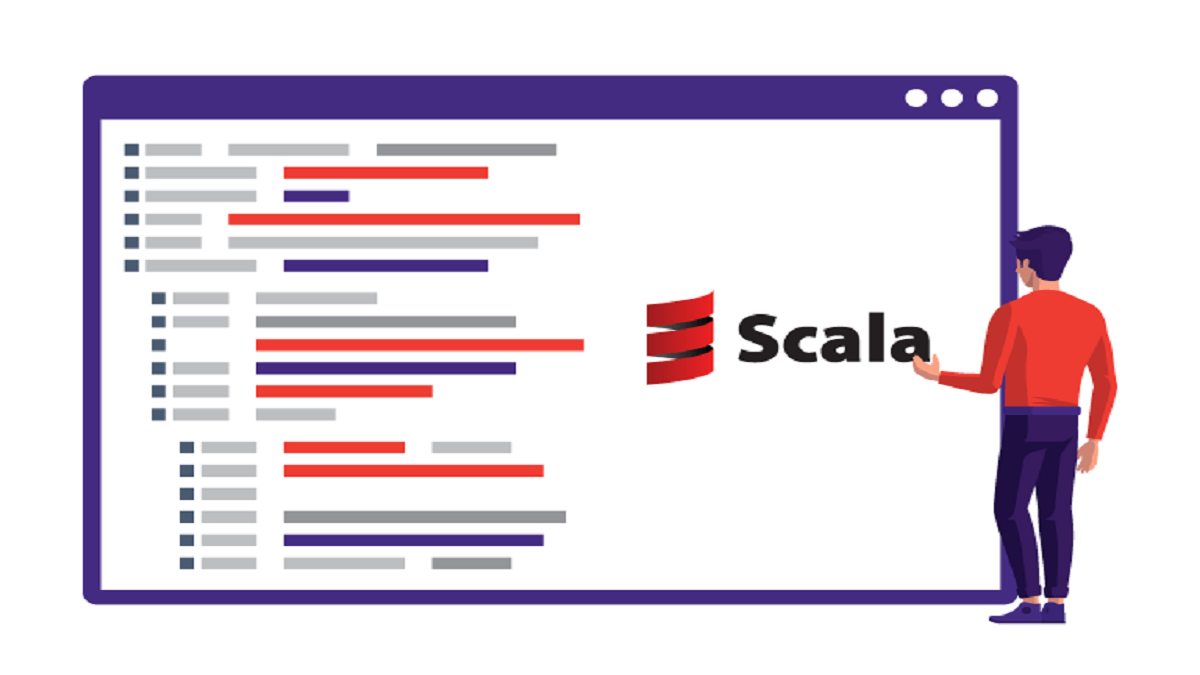
Scala is a free and open-source programming language that has seen significant growth in popularity over the last several years. Scala is a new programming language that was developed as an alternative to Java. It brings a variety of advantages to the field of software development. Scala is a programming language that can be executed on the Java Virtual Machine. This enables developers to make use of already created Java libraries. It also allowing them to make use of the features of a more expressive language. In addition, Scala offers a type-safe programming environment. This makes the code more accessible and simpler to comprehend, even for those who were not directly involved in its creation.
Scala was developed explicitly to become a superior programming language. Improving upon Java by omitting features that were seen to be unnecessarily restrictive, laborious, or annoying for software developers. There are code differences and paradigm changes that may make early learning of Scala programming a little more challenging. But, the result is a much cleaner and better-organized language that is eventually simpler to use and enhances productivity. The outcome is a much cleaner and well-organized language that can boost productivity.
Scala is increasingly becoming the go-to option for applications requiring the processing of large amounts of data and machine learning due to its excellent performance characteristics it has. In this article, we will discuss the many advantages offered by Scala development services. Also, we will demonstrate why the use of this robust programming language is the best solution to meet your software requirements.
Advantages of Scala Development
-
Applications for the Web
Scala frameworks provide a wide variety of functionality, like template rendering, database access, and routing. It makes simple to develop sophisticated online applications. Scala allows developers to create web applications that are high-performing, scalable, and dependable. Also, being able to manage massive quantities of traffic. It is a popular option for enterprises that demand strong online apps.
-
Processing in Parallel with Batches
A method of processing data on a computer known as parallel batch processing enables many different jobs to be carried out at the same time. This in turn boosts the system’s overall performance. It is often used in large-scale data processing, which requires the processing of enormous amounts of data effectively. Parallel batch processing has the potential to dramatically cut down the amount of time needed to finish a job. It will be done by breaking it down into some smaller tasks and then performing each of those tasks individually.
-
Concurrency and Distributed Computing
Within the realm of computer science, two ideas that are closely connected are concurrent application and distributed application. Both concurrency and distributed application relate to the capacity of a system to carry out many tasks at the same time. While, it distributed application more specifically describes a system that is dispersed over numerous computers or networks. Concurrency is a feature that must be present in a distributed program to guarantee that all components of the system function in a streamlined and effective manner.
Read: Possibly Mind-Altering Advantages Of Microservices Architecture
-
Data Analysis in Scala
The analysis of data is an essential step in gaining an understanding of the patterns and trends included within massive datasets. Spark is a framework for processing large amounts of open-source data that enables the analysis of data to occur quickly and effectively. The distributed processing capabilities of Scala allow it to be utilized for the analysis of huge datasets across numerous workstations.
-
Prototyping Potential Solutions is Simplified
Because of advances in technology, it is now simpler to prototype potential solutions than it ever was in the past. Because of the proliferation of 3D printing, designers and engineers are now able to rapidly and easily produce physical models of their designs and ideas. This allows them to test and enhance their creations before putting them into production.
-
Runs on the Java Virtual Machine (JVM)
Scala’s capability of running on the Java Virtual Machine (JVM) is one of the most significant benefits of using this programming language. Because of this, code written in Scala may be combined with code written in Java. It makes the transition to Scala simpler for developers who are already comfortable working with Java. This cuts down on the amount of time and resources needed to build new software. This will make a solution that is more efficient and hence more cost-effective. In general, code integration with Java offers a simplified approach to the creation of software that may be of advantage to companies of any size.
-
Scalability
Scala’s scalability is an additional benefit of using this programming language. It was developed to manage large-scale projects and has a wide range of applications, including the development of online applications, data analysis, and machine learning, among others. Because of this, it is a flexible language that may be used in several different settings. A programming language is also an excellent option for businesses that want to construct complicated systems. It can expand in line with the expansion of the company’s operations. Scala is a programming language that has seen a surge in popularity over the last several years. Also, it has been adopted by some major corporations, such as Twitter, LinkedIn, and Netflix. Scala is a language that, because of its adaptability and scalability, will almost certainly continue to gain popularity over the next several years.
Read: What are some Up-Skilling Options for PL SQL Developers in 2023?
Bottom Line
Scala provides a comprehensive strategic view that includes a variety of sides, including IT infrastructure, software applications, cloud computing, and digital communication, to help digital transformation in the most effective way possible. With the growing demand for Scala development services, it is clear that this language is here to stay. It is diverse, efficient, and offers greater flexibility, making it the perfect language for any type of project.
